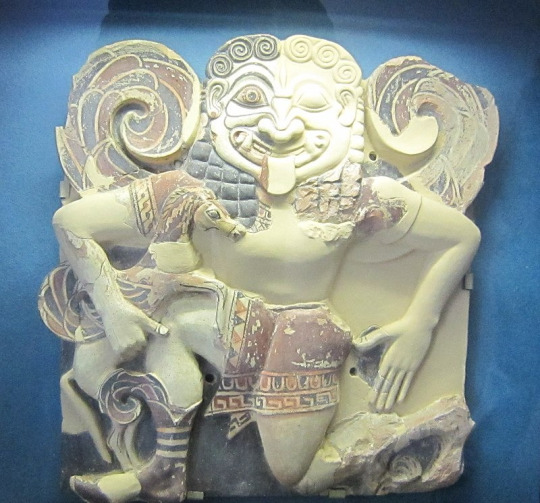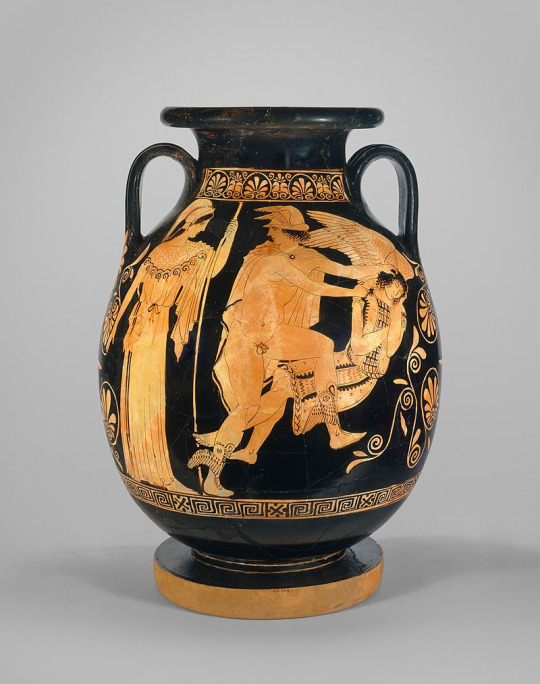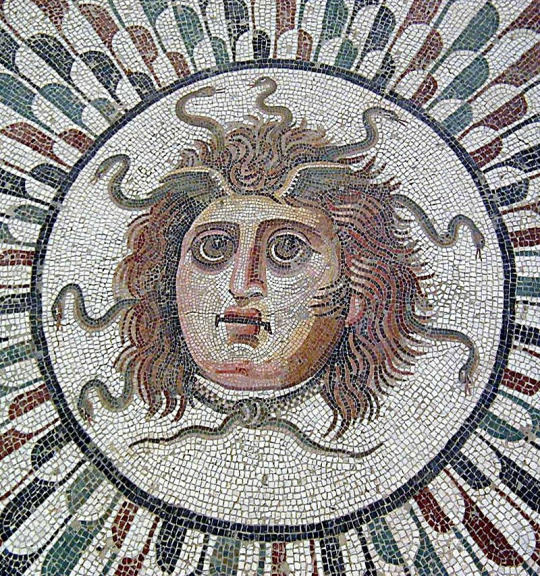Text
You want me to play sports?
The thing that killed Hyacinthus?
116 notes
·
View notes
Text
Fundamental sources
Greek mythology is recorded in numerous texts, covering multiple centuries, locations, traditions and variations. Many of these ancient sources are lost to us, or fragmentary. This leaves us with an incomplete (albeit vast) and oftentimes incoherent collection of written sources on which to base my own work.
The sources which are considered by the ancient Greeks themselves as foundational and central to Greek mythology are essentially : the early Greek epic poets (amongst which is, of course, Homer), Hesiod (author of the famed Theogony, not counted as an epic poet) and the Homeric Hymns (called Homeric because they are written in the same language, style and meter as the Iliad and Odyssey). These texts were written down between the 8th and the 5th centuries BC, and are based on oral material that goes much further back.
Of the early epic poems, only the Iliad and the Odyssey attributed to Homer still survive, considered by the ancient Greeks as the pinnacle of their literature. Of all the other epics, only fragments and (if we're lucky) summaries remain. The Trojan Cycle was made of the following works :
The Cypria, which describes the origin and early years of the Second Trojan War
The Iliad, which tells of the wrath of Achilles and the death of Hector
The Aethiopis, which describes the intervention of Amazons and Ethiopians in the war, and the death of Achilles
The Little Iliad, a dense work that covers events from the funeral of Achilles to the episode of the Trojan horse
The Sack of Troy, which, as its title suggests, tells the events from the Trojan horse to the desctruction of the city and the anger of Athena
The Return from Troy, in which the Greek heroes return home, with tragic developments, such as the murder of Agamemnon and the revenge of Orestes
The Odyssey, tells the return of Ulysses, the longest and most adventurous return of all Greek heroes
The Telegony, that covers further adventures of Ulysses until he is killed by Telegonus, his son by Circe
To this we can add a Theban Cycle (covering the life of Oedipus, both Theban Wars and the revenge of Alcmaeon) and a few additional epics (including a Titanomachy I would have loved to read). Chances are high that there were many more, lost to us even by name.
Hesiod left us three complete works and a number of fragments, the most important of which is the Theogony, which describes how the universe began and the early history of the gods.
Lastly, the Homeric Hymns, of which three may be later additions, are poems or songs that praise the gods, each hymn being dedicated to a specific god.
In the context of my work, these sources will be taken as having the highest authority. Later sources will be accepted if they provide additional material that completes or extends the earlier texts, or if they help resolve an obvious inconsistency or impossibility.
47 notes
·
View notes
Text
The truth about Medusa and her rape... Mythology breakdown time!
With the recent release of the Percy Jackson television series, Tumblr is bursting with mythological posts, and the apparition of Medusa the Gorgon has been the object of numerous talks throughout this website… Including more and more spreading of misinformation, and more debates about what is the “true” version of Medusa’s backstory.
Already let us make that clear: the idea that Medusa was actually “blessed” or “gifted” by Athena her petrifying gaze/snake-hair curse is to my knowledge not at all part of the Antique world. I still do not know exactly where this comes from, but I am aware of no Greek or Roman texts that talked about this – so it seems definitively a modern invention. After all, the figure of Medusa and her entire myth has been taken part, reinterpreted and modified by numerous modern women, feminist activist, feminist movements or artists engaged in the topic of women’s life and social conditions – most notably Medusa becoming the “symbol of raped women’ wrath and fury”. It is an interesting reading and a fascinating update of the ancient texts, and it is a worthy take on its own time and context – but today we are not talking about the posterity, reinvention and continuity of Medusa as a myth and a symbol. I want to clarify some points about the ACTUAL myth or legend of Medusa – the original tale, as told by the Greeks and then by the Romans.
Most specifically the question: Was Medusa raped?
Step 1: Yes, but no.
The backstory of Medusa you will find very often today, ranging from mythology manuals (vulgarization manuals of course) to Youtube videos, goes as such: Medusa was a priestess of Athena who got raped by Poseidon while in Athena’s temple, and as a result of this, Athena punished Medusa by turning her into the monstrous Gorgon.
Some will go even further claiming Athena’s “curse” wasn’t a punishment but a “gift” or blessing – and again, I don’t know where this comes from and nobody seems to be able to give me any reliable source for that, so… Let’s put this out of there.
Now this backstory – famous and popular enough to get into Riodan’s book series for example – is partially true. There are some elements here very wrong – and by wrong I do mean wrong.
The story of Medusa being raped and turned into a monster due to being raped does indeed exist, and it is the most famous and widespread of all the Medusa stories, the one people remembered for the longest time and wrote and illustrated the most about. Hence why Medusa became in the 20th century this very important cultural symbol tied to rape and the abuse of women and victim-blaming. HOWEVER – the origin of this story is Ovid’s Metamorphoses, from the first century CE or so. Ovid? A Roman poet writing for Roman people. “Metamorphoses”? One of the two fundamental works of Roman literature and one of the two main texts of Roman mythology, alongside Virgil’s Aeneid. This is a purely Roman story belonging to the Roman culture – and not the Greek one. The story of Medusa’s rape does not have Greek precedents to my knowledge, Ovid introduced the element of rape – which is no surprise given Ovid turned half of the romances of Greek mythology into rapes. Note that, on top of all this, Ovid wasn’t even writing for religious purposes, nor was his text an actual mythological effort – he wrote it with pure literary intentions at heart. It is just a piece of poetry and literature taking inspiration from the legends of the Greek world, not some sort of sacred text.
Second big point: The legend I summarized above? It isn’t even the story Ovid wrote, since there are a lot of elements that do not come from Ovid’s retelling of the story (book fourth of the Metamorphoses). For example Ovid never said Medusa was a priestess of Athena – all he said was that she was raped in the temple of Athena. I shouldn’t even be writing Athena since again, this is a Roman text: we are speaking of Minerva here, and of Neptune, not of Athena or Poseidon. Similarly, Minerva’s curse did not involve the petrifying gaze – rather all Ovid wrote about was that Minerva turned Medusa’s hair into snakes, to “punish” her because her hair were very beautiful, and it was what made her have many suitors (none of which she wanted to marry apparently), and it is also implied it is what made Neptune fall in love (or rather fall in lust) with her. I guess it is from this detail that the reading of “Athena’s curse was a gift” comes from – even though this story also clearly does victim-blaming of rape here.
But what is very fascinating is that… we are not definitively sure Neptune raped Medusa in Ovid’s retelling. For sure, the terms used by Ovid in his fourth book of Metamorphoses are clear: this was an action of violating, sexually assaulting, of soiling and corrupting, we are talking about rape. But Ovid refers several other times to Medusa in his other books, sometimes adding details the fourth-book stories does not have (the sixth book for examples evokes how Neptune turned into a bird to seduce Medusa, which is completely absent from the fourth book’s retelling of Medusa’ curse). And in all those other mentions, the terms to designate the relationship between Medusa and Neptune are more ambiguous, evoking seduction and romance rather than physical or sexual assault. (It does not help that Ovid has an habit of constantly confusing consensual and non-consensual sex in his poems, meaning that a rape in one book can turn into a romance in another, or reversal)
But the latter fact makes more sense when you recall that the rape element was invented and added by Ovid. Before, yes Poseidon and Medusa loved each other, but it was a pure romance, or at least a consensual one-night. Heck, if we go back to the oldest records of the love between Poseidon and Medusa, back in Hesiod’s Theogony, we have descriptions of the two of them laying together in a beautiful, flowery meadow – a stereotypical scene of pastoral romances – with no mention of any brutality or violence of any sort. As a result, it makes sense the original “romantic” story would still “leak” or cast a shadow over Ovid’s reinvented and slightly-confused tale.
Step 2: So… no rape?
Well, if we go by Greek texts, no, apparently Medusa was not raped in Greek mythology, and only became a rape victim through Ovid.
The Ancient Greek texts all record Poseidon and Medusa sleeping with each other and having children, but no mention of rape. And the whole “curse of Athena” thing is not present in the oldest records – no temple of Athena soiling, no angry Athena cursing a poor girl… “No curse?” you say “But then how did Medusa got turned into a Gorgon”? Answer: she did not. She was born like that.
As I said before, the oldest record of Medusa’s romance but also of her family comes from Hesiod’s Theogony (Hesiod being one of the two “founding authors” of Greek mythology, alongside Homer – Homer did wrote several times about Medusa, but only as a disembodied head and as a monster already dead, so we don’t have any information about her life). And what do we learn? That Medusa is part of a set of three sisters known as the Gorgons – because oh yes, Ovid did not mention Medusa’s sister now did he? How did Medusa’s sisters ALSO got snake-hair or petrifying-gaze if only Medusa was cursed for sleeping with Neptune? Ovid does not give us any answer because again, it is an “adaptational plot hole”, and the people that try to adapt Ovid’s story have to deal with the slight problem of Stheno and Euryale needing to share their sister’s curse despite seemingly not being involved in the whole Neptune business. Anyway, back to the Greek text.
So, you have those three Gorgon sisters, and Medusa is said to be mortal while her sisters are not. Why is it such a big deal? Because Medusa wasn’t originally some random human or priestess. Oh no! Who were the Gorgons’ parents? Phorcys and Keto/Ceto, aka two sea-gods. Not just two sea-gods – two sea-gods of the ancient, primordial generation of sea-gods, the one that predated Poseidon, and that were cousins to the Titans, the sea-gods born of Gaia mating with Pontos.
So the Gorgons were “divine” of nature – and this is why Medusa being a mortal was considered to be a MASSIVE problem and handicap for her, an abnormal thing for the daughter of two deities. But let’s dig a bit further… Who were Phorcys and Ceto? Long story short: in Greek mythology, they were considered to be sea-equivalents of Typhon and Gaia. They were the parents of many monsters and many sea-horrors: Keto/Ceto herself had her name attributed and equated with any very large creature (like whales) or any terrifying monster (like dragons) from the sea. The Gorgons themselves was a trio of monsters, but their sisters, that directly act as their double in the myth of Perseus? The Graiai – the monstrous trio of old women sharing one eye and one tooth. Hesiod also drops the fact that Ladon (the dragon that guarded the golden apples of the Hesperids), and Echidna (the snake-woman that mated with Typhon and became known as the “mother of monsters”) were also children of Phorcys and Ceto, while other authors will add other monster-related characters such as Scylla (of Charybdis and Scylla fame), the sirens, or Thoosa (the mother of Polyphemus the cyclop). Medusa herself is technically a “mother of monsters” since she birthed both Pegasus the flying horse and Chrysaor, a giant. So here is something very important to get: Medusa, and the Gorgons, were part of a family of monsters. Couple that with the absence of any mention of curses in these ancient texts, and everything is clear.
Originally Medusa was not a woman cursed to become a monster: she was born a monster, part of a group of monster siblings, birthed by monster-creating deities, and she belonged to the world of the “primordial abominations from the sea”, and the pre-Olympian threats, the remnants of the primordial chaos. It is no surprise that the Gorgons were said to live at the edge of the very known world, in the last patch of land before the end of the universe – in the most inhuman, primitive and liminal area possible. They were full-on monsters!
Now you might ask why Poseidon would sleep with a horrible monster, especially when you recall that the Greeks loved to depict the Gorgons as truly bizarre and grotesque. It wasn’t just snake-hair and petrifying gaze: they had boar tusks, and metallic claws, and bloated eyes, and a long tongue that constantly hanged down their bearded chin, and very large heads – some very old depictions even show her with a female centaur body! In fact, the ancient texts imply that it wasn’t so much the Gorgon’s gaze or eyes that had the power to turn people into stone – but that rather the Gorgon was just so hideous and so terrifying to look at people froze in terror – and then literally turned into stone out of fear and disgust. We are talking Lovecraftian level of eldritch horror here. So why would Poseidon, an Olympian god, sleep with one of these horrors? Well… If you know your Poseidon it wouldn’t surprise you too much because Poseidon had a thing for monsters. As a sort of “dark double” of Zeus, whereas Zeus fell in love with beautiful princesses and noble queens and birthed great gods and brave heroes, Poseidon was more about getting freaky with all sorts of unusual and bizarre goddesses, and giving birth to bandits and monsters. A good chunk of the villains of Greek mythology were born out of Poseidon’s loins: Polyphemus, Antaios, Orion, Charybdis, the Aloads… And even his most benevolent offspring has freaky stuff about it – Proteus the shapeshifter or Triton half-man half-fish… So yes, Poseidon sleeping with an abominable Gorgon is not so much out of character.
Step 3: The missing link
Now that we established what Medusa started out as, and what she ended up as… We need to evoke the evolution from point Hesiod to point Ovid, because while people summarized the Medusa debate as “Sea-born monster VS raped and punished woman”, there is a third element needed to understand this whole situation…
Yes Ovid did invent the rape. But he did not invent the idea that Medusa had been cursed by Athena.
The “gorgoneion” – the visual and artistic motif of the Gorgon’s head – was, as I said, a grotesque and monstrous face used to invoke fright into the enemies or to repel any vile influence or wicked spirit by the principle of “What’s the best way to repel bad stuff? Badder stuff”. Your Gorgon was your gargoyle, with all the hideous traits I described before – represented in front (unlike all the other side-portraits of gods and heroes), with the face being very large and flat, a big tongue out of a tusked-mouth, snake-hair, bulging crazy eyes, sometimes a beard or scales… Pure monster. But then… from the fifth century BCE to the second century BCE we see a slow evolution of the “gorgoneion” in art. Slowly the grotesque elements disappear, and the Gorgon’s face becomes… a regular, human face. Even more: it even becomes a pretty woman’s face! But with snakes instead of hair. As such, the idea that Medusa was a gorgeous woman who just had snakes and cursed-eyes DOES come from Ancient Greece – and existed well before Ovid wrote his rape story.
But what was the reason behind this change?
Well, we have to look at the Roman era again. Ovid’s tale of Medusa being cursed for her rape at the hands of Neptune had to rival with another record collected by a Greek author Apollodorus, or Pseudo-Apollodorus, in his Bibliotheca. In this collection of Greek myths, Apollodorus writes that indeed, Medusa was cursed by Athena to have her beautiful hair that seduced everybody be turned into snakes… But it wasn’t because of any rape or forbidden romance, no. It was just because Medusa was a very vain woman who liked to brag about her beauty and hair – and had the foolish idea of saying her hair looked better than Athena’s. (If you recall tales such as Arachne’s or the Judgement of Paris, you will know that despite Athena being wise and clever, one of her main flaws is her vanity).
“Wait a minute,” you are going to tell me, “The Bibliotheca was created in the second century CE! Well after Greece became part of the Roman Empire, and after Ovid’s Metamorphoses became a huge success! It isn’t a true Greek myth, it is just Ovid’s tale being projected here…” And people did agree for a time… Until it was discovered, in the scholias placed around the texts of Apollonios of Rhodes, that an author of the fifth century BCE named Pherecyde HAD recorded in his time a version of Medusa’s legend where she had been cursed into becoming an ugly monster as punishment for her vanity. We apparently do not have the original text of Pherecyde, but the many scholias referring to this lost piece are very clear about this. This means that the story that Apollodorus recorded isn’t a “novelty”, but rather the latest record of an older tradition going back to the fifth century BCE… THE SAME CENTURY THAT THE GORGONEION STARTED LOSING THEIR GROTESQUE, and that the face of Medusa started becoming more human in art.
[EDIT: I also forgot to add that this evolution of Medusa is also proved by strange literary elements, such as Pindar's mention in a poem of his (around 490 BCE) of "fair-cheeked Medusa". A description which seems strange given how Medusa used to be depicted as the epitome of ugliness... But that makes sense if the "cursed beauty" version of the myth had been going around at the time!]
And thus it is all connected and explained. Ovid did invent the rape yes – but he did not invent the idea of Athena cursing Medusa. It pre-existed as the most “recent” and dominating legend in Ancient Greece, having overshadowed by Ovid’s time the oldest Hesiodic records of Medusa being born a monster. So what Ovid did wasn’t completely create a new story out of nowhere, but twist the Greek traditions of Athena cursing Medusa and Medusa having a relationship with Poseidon, so that the two legends would form one and same story. And this explains in retrospect why Ovid focuses so much on describing Medusa’s beautiful hair, and why Ovid’s Minerva would think turning her hair into snake would be a “punishment fit for the crime”: these are leftovers of the Greek tale where Medusa was punished for her boasting and her vanity.
CONCLUSION
Here is the simplified chronology of how Medusa’s evolution went.
A) Primitive Greek myths, Hesiodic tradition: Born a monster out of a family of sea-monsters and monstrous immortals. Is a grotesque, gargoylesque, eldritch abomination. Athena has only an indirect conflict with her, due to being Perseus’ “fairy godmother”. Has a lovely romance with Poseidon.
B) Slow evolution throughout Classical Greece and further: Medusa becomes a beautiful, human-looking girl that was cursed to have snake for hair and petrifying eyes, instead of being a Lovecraftian horror people could not gaze upon. Her conflict with Athena becomes direct, as it is Athena that cursed her due to being offended by her vain boasting. Her punishment is for her vanity and arrogant comparison to the goddess.
C) Ovid comes in: Medusa’s romance with Poseidon becomes a rape, and she is now punished for having been raped inside Athena’s temple.
[As a final note, I want to insist upon the fact that the story of Medusa being raped is not less "worthy" than any other version of the myth. Due to its enormous popularity, how it shaped the figure of Medusa throughout the centuries, and how it still survives today and echoes current-day problems, to try to deny the valid place of this story in the world of myths and legends would be foolish. HOWEVER it is important to place back things in their context, to recognize that it is not the ONLY tale of Medusa, that it was NOT part of Greek mythology, but rather of Roman legends - and let us all always remember this time Poseidon slept with a Lovecraftian horror because my guy is kinky.]
EDIT:
For illustration, I will place here visuals showing how the Ancient art evolved alongside Medusa's story.
Before the 5th century BCE: Medusa is a full-on monster






From the 5th century to the 2nd century BCE: A slow evolution as Medusa goes from a full-on monster to a human turned into a monster. As a result the two depictions of the grotesque and beautiful gorgoneion coexist.



Post 2nd century BCE: Medusa is now a human with snake hair, and just that



4K notes
·
View notes
Text
Nico really fucking hates capture the flag.
Well, not always. Last week was fun. Last week was the annual Everyone Against The Stolls (to atone for their crimes), and Nico got to chase Connor around at top speeds, cackling, committing his shrieking and begs for mercy to memory. That was nice. That almost made him forgive the fucker for digging a trench under Nico’s unwelcome mat for him to fall into at seven thirty in the godsdamn morning.
But tonight’s game is boring.
He’s been standing, alone, at the base of the flag for the past forty bajillion hours. He’d raised a few dozens skeletons to spar with at first, since animating them to fight himself isn’t technically against the rules, but that got dull fast. (It isn’t much fun sparring with a partner who doesn’t have a brain. He already has to do that enough with Percy when he comes to visit camp.) He’d climbed the various trees around the clearing, or at least he tried until he got reamed by the dryads for climbing on a manner that was too annoying (?), and tried his hands at a few summoning spells. Nothing held his interest long.
And now he’s just standing, doing nothing, and he’s not allowed to leave. He has to stay in this stupid spot on the off chance that someone comes stumbling over to fight him for the flag.
“You’re our best swordsman, she said,” he says mockingly, beaming the nastiest vibes he can manage in Piper’s vague direction. “We need you on our defensive line, she said. Nyeh nyeh nyeh.”
His checks his watch. He groans. He looks critically over the grass, looking for a softer patch, and when he locates it he throws himself dramatically upon it, groaning louder.
“This sucks!” he yells, to no one.
“Will you shut up!” shouts back the dryad he pissed off earlier. “For the love of photosynthesis! Fuck!”
He bites his tongue hard to hold back laughter. (If he can avoid getting his entire cabin overgrown with prickle bushes again, that’d be great.) “Sorry,” he calls, trying with everything he has to sound contrite. Convincing his father to fight the Titan War was easier, actually. Acting is not his calling.
“Hmph!”
At least listening to see if she’ll come out and yell at him again provides something to ease his boredom. Yes, he’s going to regret bothering her, but in his defense, solo guarding is cruel and unusual punishment. He’d rather sit by an outlet with a fork and see if he can poke and let go fast enough to avoid dying. That at least would be interesting.
A rustling of leaves recaptures his attention, and he pauses.
“Holly?”
When no one answers, which is odd because she’s taken every opportunity in the last hour to either insult him or pelt him with stones, he lifts his head.
“You’re not going to scare me, dude. I had my fear glands surgically removed to become a better soldier.”
Not true. Obviously. But a fun bonus of being the camp weirdo is that no one doubts anything he says. He’s working on convincing everyone younger than him that he needs weekly tributes of chocolate delivered to his door every Friday or the dead are going to take over the world. So far, it’s working.
“Look, Holly, I’m sorry about the zombie, okay, I promise it didn’t mean to sneeze part of its brain on you —”
The rustling sounds again, only this time Nico can see that it’s not Holly’s tree, and in fact she is nowhere to be found. Alarmed, he jumps to his feet, shifting so he’s balanced on the balls of his feet, poised to attack. Is Piper’s plan failing? Has someone actually managed to make it all the way over here without getting (gently, probably, although they lost the last game and Piper gets cranky without dessert) maimed?
The rustling sounds for a third time. This time, an armoured someone stumbles out of the underbrush, tripping over their own foot and nearly landing flat on their face.
Nico has his sword at their throat in a millisecond.
“Wo-oah, Morbius. That’s probably my least favourite sword you could stab in me.”
Nico goes bright red. “I have never wanted to stab you more than right this second.”
Will, chest plate skewed to the right, quiver completely empty, and black paint smeared under his eyes, snickers. He puts a finger on the tip of Nico’s sword and pushes it away from his neck.
“The opportunity was right there, babe. I couldn’t not.”
“You really, really could. In fact at all times, you should remember these words of wisdom: shut up.”
“…Damn. Inspiring.”
Nico rolls his eyes, but the effect is somewhat lessened by the smile on his face and the obvious pleasure in his expression. He’s even feeling merciful enough to accept Will’s kiss, although his sword keeps a good amount of distance between them. (Will’s on the blue team, after all. It would be unprofessional to be fraternizing with the enemy.
…Well, too much, anyway.)
“What’re you doing here? You’re supposed to be with the other archers, sitting in trees and causing havoc.”
Will shrugs, grinning lazily. “I quit. This game is senselessly violent and I’m Against It On Principle. I’m a pacifist, you know.”
“Uh huh.” Nico raises an eyebrow. “I assume this doesn’t count you choking Cecil out in a headlock, this morning.”
Will opens his mouth. Nothing comes out. He closes it again.
“Cecil is my mortal enemy,” he grudges after a moment. “He doesn’t count.”
“‘Course not. Not like you cried for two hours when he went to visit his mom last weekend or anything.”
“Will you — stop saying I cried. I barely teared up, okay. Barely.”
Nico can’t quite force down the stupid grin that pulls across his face, matching Will’s, nor can he resist grabbing the leather straps of his boyfriend’s armour and hauling him close.
“You better not be here to distract me,” he mumbles, leaning close and pressing a kiss to the underside of his jaw, the corner of his mouth. Will hums, settling his hands on Nico’s hips.
“Nope. Cross my heart and hope to die.”
“Drama queen.”
“Excuse — I am the least dramatic, I’ll have you know. I’m a pinnacle of solemnity. I am a shining beacon of stoicism. I am — mmfh,” He trails off. “Okay, doing this now, mhm.”
Nico smiles triumphantly into the kiss. Will, he has found, is very easy to shut up, despite his long-running nickname of Motormouth. It’s almost like he has an off button that can be accessed only by Nico sticking his tongue in his mouth. Nico is doing his civic duty, honestly. He should be compensated for his service.
(‘Course, doesn’t hurt that Will smells, like, really good, all the time, and his lips are soft as hell and he is actually quite the kisser, in fact. That is definitely a fun bonus.)
He smooths his hands over Will’s shoulders, travelling up the sides of his neck and settling in his hair. Will keens, slightly, when he wraps a finger around a frizzy golden curl and tugs, slightly, when he scratches his nails along his scalp. The rush of power at the feeling makes Nico dizzy, and his sword clatters to the ground as he busies himself with more interesting — and important — things.
Like pulling more of those sounds from his boyfriend’s throat. Or making his knees buckle, again, like he did the other night — gods, that was good, it made Will flush scarlet and Nico feel like he was fuckin’ floating, to have Will so needy and touchy and totally at his mercy —
“Free line to the flag! Go go go go!”
Nico startles, whirling towards the sudden cacophony of noises. To his horror, what looks like half the camp, helmets shining with plumes of blue, comes pouring into the clearing, weapons raised, voices mixing in one long, victorious shout. He lunges for his sword, but before he can grab it, two strong arms tighten around his torso, pinning his hands to his side.
Immediately, he knows he’s been set up.
“Oh, you — fucker!”
He feels the curve of Will’s grin against his neck. “First shower privileges for a whole month, baby.” He noses along his jaw, pressing an apologetic kiss to his cheek. “Couldn’t resist.”
Nico struggles, aghast, watching the once-red flag shimmer in Lou Ellen's hold to a bright, shining blue. “I am breaking up with you, you traitor, you Iago, you vixen — ”
Will snorts. He ducks down and pecks Nico on the lips, again, and again, and then shifts to his cheeks, the bridge of his nose, his temples, his forehead, and all over his face, making louder and louder mwah sounds until Nico is laughing, punching his shoulder and shoving him away.
“Okay! Okay. Let me go, you villainous toad. We will discuss how much you’ll have to grovel for my forgiveness after Piper finishes yelling at me for getting distracted.”
Will presses one last kiss to his nose, smiling cheekily before stepping away, heading towards his boasting team. “Enjoy that lecture! Love you!”
“Yeah, yeah.” Nico rolls his eyes, resting his aching cheek in his hand. “Love you too, asshole.”
452 notes
·
View notes
Text
i love how in heroes of olympus, there’s a boat full of couples (+leo☺️). and yet even if you didn’t know when each couple started dating, it’s so blatantly obvious that percy and annabeth have been together the longest, and are the most serious
cause frank and hazel are still pretty nervous/unsure with each other. they JUST started dating, and are so pure and adorable. they just haven’t quite figured out the romance part yet
and jason and piper have their moments, but they’re just so… distant. like not physically, of course, but they just don’t really seem to connect on a deep level. and they aren’t super affectionate, at least not physically or openly. piper is constantly unsure about where they’re at, and while jason has thoughts about how great piper is, he doesn’t openly show his feelings too often.
but percabeth? they’re the oldest in age (physically), have known each other the longest, and have been romantically committed to each other for the most time. they act like they’ve been together for eternity, which is funny since they were technically only dating for 4 months before percy got abducted. but they just have such a deep history together and such an intense connection. they’re in it for the long run. there’s no doubt or uncertainty - and it shows. like…annabeth is so wife girlfriend. there are so many funny/cute little moments, like her scolding him for putting too much syrup on his pancakes, and telling him to take a shower when he smells bad. and when percy suggests him and jason should go on a dangerous quest instead of annabeth and piper, instead of being like “omg he cares so much about me😍” (which hazel and piper would have done) annabeth is like “what seaweed brain?? you think two guys can do better than two girls??” and percy is immediately like “uh uh NO nope i definitely do NOT think that!!” he knows better. the immediate fear is so husband boyfriend of him. they simultaneously have the most disagreements (remember when percy called annabeth out when she thought she should navigate through rome alone, and basically called her stupid for thinking it was a good idea, and then they argued and had a face-off, which percy won) - while also being the most lovey dovey (they’re constantly putting their hands on each other - annabeth putting her hand on his chest to calm him down, putting their hands on each other’s arms for support, percy having his arm around her when they’re at the edge of the ship, always giving each other a kiss on the mouth or the cheek when they separate, etc). and they have no issues sneaking off in the middle of the night to do some talking and kissing. and quite frankly, making out in front of piper in BoO (remember that? when piper got super uncomfortable at how long their kiss was lasting, and then annabeth let out, and i quote, “grunt-whimpers”). they are just so natural and comfortable with each other. piper says it herself.
i just think it’s so funny. little frazel being adorable and blushing when they hold hands, jiper is happy to be dating but they’re also a little angsty and uncertain, and then there’s percabeth just being the old married couple they are. (and leo is being cute and fixing stuff)
3K notes
·
View notes
Text
pov nico bounds up to will one day all “will will they made a myth-o-magic card for you” and wills all “what the fuck let me see” and nico just hands him this
and then laughs his ass off

545 notes
·
View notes
Text
the funny thing about william andrew solace is that he has rizz but a very specific branch of rizz that has never worked on any living soul. the funnier thing about niccolò di angelo is that the rizz works on him and only him and unfortunately the rizz works on him HARD
578 notes
·
View notes
Text
Will: Are we fighting or flirting?
Nico: I'm pinning you against a wall with my hand around your neck-
Will: Your point?
346 notes
·
View notes
Text
Apollo and Hyacinthus Headcanons (because i’m bored)
-Hyacinthus is usually a very jumpy person, borderline paranoid because of Zephyrus. So when he sleeps he can be waken by the slightest noise. But whenever he’s around Apollo he would take constant naps, because he feels so safe that he feels comfortable enough to go to sleep.
-Hyacinth LOVES Apollo’s voice but especially his singing. Whenever Apollo would sing to him, animals would literally come up to Apollo just to listen. Is Apollo actually a disney princess in disguise? Tune in to find out! But seriously it’s also because his twin sister has a connection to wildlife, so he kind of has a slight connection as well.
-Apollo has chronic headaches. Sometimes all the prophecies racing through his head at once, when hes not focusing can cause VERY painful headaches, think cluster headaches aka suicide headaches. Hyacinthus doesn’t really know what to do so he’ll just hold Apollo until it goes away
-Apollo is actually the “bottom” in the sexual manner but not because of the reason you think. He wanted to show Hyacinthus that he doesn’t want to “dominate” him and control him like Zephyrus, so he essentially allows Hyacinthus to to take control instead.
-Flowers started to bloom far more often when Apollo was in love with Hyacinth, because the sun was so focused on Sparta then anywhere else. Not too much, but enough to make a difference.
-Apollo took care of Hyacinth even BEFORE they got into a relationship. Thats why Hyacinth never got sick or his injuries healed so much more quicker.
141 notes
·
View notes
Note
Hi! I’m pretty new to the world of Achilles and Patroclus (I read The Song Of Achilles last month) and I just saw your post about your love for them. When you said “there's just so much stuff out there about them (tsoa, hades game, the iliad, a bunch of other myths and adaptations, non fiction books, academic papers etc)” I was wondering if you could touch on the other myths and adaptations part maybe? I’m not exactly sure where to begin there but I would appreciate any guidance you could give!
Oh boy I don't know where to start either because there's a LOT. I don't want to overwhelm you so I'll just list a few key myths and adaptations off the top of my head:
Adaptations
So as far as adaptations go, I will include works where both Achilles and Patroclus show up and that are inspired by the Iliad.
Hades Game: I'm pretty sure you're already familiar with this, just mentioning it just in case!
Aristos the musical: it's a musical as the name suggests, and it revolves around Achilles and Patroclus' lives from Pelion all the way to Troy. It's really lovely and has made me emotional on numerous occasions and I love revisiting it every so often! It also has a Tumblr account: @aristosmusical
Troilus and Cressida: this is Shakespeare's take on the Trojan War and it's quite interesting, not really faithful to the Iliad but offers a sort of different perspective on the characters and the events that led to Hector's death.
Achilles (1995) by Barry JC Purves: it's a short stop motion film using clay puppets, it's on Youtube and it's only 11 mins and I think it's worth a watch! I find it very compelling visually and any adaptation where Achilles and Patroclus are lovers is a plus in my book 🫶
Holding Achilles: this is an Australian stage production by the Dead Puppet Society, I really enjoyed it and I found it an interesting blend of TSOA and Iliad Patrochilles, which also featured some cool new elements that I hadn't really seen before. It used to be free to watch for a while but now I think you have to pay to watch it, there's more info on their website.
The Silence of the Girls: a novel by Pat Barker, it's a take on the events of the Iliad mostly through Briseis' eyes, I personally didn't really like the book or the characterisations but hey both Achilles and Patroclus are in it so it might be worth a read.
There are some other novels I've heard of where Achilles and Patroclus appear (A Thousand Ships by Natalie Haynes, Wrath Goddess Sing by Maya Deane) and also a TV show called Troy: Fall of a City but I haven't read/watched them so I can't really rec them
Myths
Most myths revolve around Achilles, there aren't that many with Patroclus I'm afraid, but here are some of my favourites:
Achilleid by Publius Papinius Statius: this is an epic poem about Achilles' stay on Skyros disguised as a girl and his involvement with Deidameia. It's interesting but I'd personally take the characterisations and events in it with a grain of salt because Romans were notorious for their unsympathetic portrayal of Greek Homeric heroes but it's still a cool thing that's out there and free to read online.
Iphigenia at Aulis: a tragedy by the ancient Greek playwright Euripides, it's basically the dramatised version of the myth of Iphigenia's sacrifice in Aulis which predates the Iliad, there are many obscure versions of this myth but Euripides' sort of updated version is my favourite, I will never shut up about this play!! Lots of a nuance and very interesting portrayals of Achilles, Agamemnon, Menelaus, Clytemnestra, Iphigenia and pretty much everyone in there, well worth a read.
Lost plays: there are several plays in which Achilles appears but that have been lost or survive only in fragments, but two of my favourites are Euripides' Telephus and Aeschylus' Myrmidons. Telephus takes place before the Trojan War, while the Greeks are on their way to Troy. I really like Achilles' characterisation in the fragments that remain and also the fact that he was already renowned for his knowledge of medicine and healing despite how young he was. The fragments that survive from Aeschylus' Myrmidons I think are fewer but the play was extremely popular at the time it was presented to the public and it sparked a lot of controversy re: Achilles and Patroclus' relationship and who tops/bottoms so I think that's kind of funny lol.
There are lots of other obscure little myths about Achilles that I've picked up by reading various books, papers and wiki posts on the matter and that are just too numerous to list here, but what I will mention and that I think concludes the myths section of this post pretty neatly is that the Iliad and the Odyssey are not the only works about the Trojan War that were written, merely the only works that survived. The rest of the books in the Epic Cycle have been preserved either in fragmentary form or in descriptions in other works, and I think the Epic Cycle wiki page is a good place to start if you want to get an idea of what each of those books contained.
I hope this helped! 💙
46 notes
·
View notes
Text
Something I find makes the life and death of Achilles far more tragic is the fact that all he is is the Trojan War. His parents’ wedding begins the conflict, and he dies before the end of the war. His entire life was spent in something he had no control over. Did he know Helen? Paris? Hektor? The Trojans became his enemies only when he reached the beaches of Troy.
Hell, if we go by the Achilleid, Achilles didn’t even know what the war was about until he was sailing to Troy. A young boy whose birth produced an unjust prophecy that dictated the rest of his life: Live long and die in obscurity, or die in war and live in the minds of the people forever. No greek man of his time could bear to die in obscurity, but it was especially impossible for Achilles to do so. His father Peleus, a legendary Argonaut whose adventures would be remembered for millenia, his mother Thetis, a towering goddess raised by the queen of the gods herself.
Their child had to be known.
At Aulis the greeks call for Achilles, a legend before he even steps into the battlefield, and he is forced to go to war. And he fights, he kills, he ravages the city of Troy. A boy who has never even seen a battle in his life, living in peaceful Pthia and later protected by mighty Chiron in Thessally, becomes a machine specifically created for one purpose: To destroy Troy.
This is the reason why Achilles refuses to fight after the taking of Briseis. Unlike Agamemnon, who lived before the Trojan War, who had a wife and family before the Trojan War, who will leave Troy. Or Odysseus who will tell his tales to his son and wife after 20 years away. Or Menelaus who after years regains his family and rules Sparta in peace. Achilles has no life, no future, he IS Troy, more than even Hektor, Paris, and Priam are. Thus, when his honor is threatened, everything he has ever lived for has been taken away from him. Realize that before the taking of Briseis, Agamemnon mentioned takingthe “bride prizes” from the other greek kings and despite this not going anywhere none of them attempted to argue. Would Odysseus attempt to kill Agamemnon if his bride prize were taken? Would Diomedes or Greater Ajax?
And yet, after Achilles lives his entire life for war. After he struggles and suffers so much at the face of adversity. At the loss of his everything, Patroklos. At the slight to his honor. He spends the rest of eternity regretting everything he had ever done. Perhaps it is a mercy to Achilles that shades forget their life on earth
284 notes
·
View notes
Link
2K notes
·
View notes
Photo


Parallels on tour: same fan project (17/?)
LTWT: Santiago (15/05/22)
HSLOT2: Krakow (18/07/22)
784 notes
·
View notes
Photo
Finally a bottom Louis fic recompilation

Here are some amazing bottom Louis fics that were posted or completed during the month of June. We really hope you enjoy this list. Happy reading!
1) Effervescent Opal, Say My Name | Mature | 3463 words
Louis has an oversupply of milk after his first pregnancy and Harry wants nothing more than to suck him dry.
2) Tide’s Deathless Death | Explicit | 4350 words
The Red Serpent gleamed in all of her marvellous glory from where she was anchored a meagre few miles away from the land. Her flag waving proudly in the afternoon sun. The image was certainly memorable, of the flag, that is; a serpent coiled viciously around a human heart, fangs sunken into the organ and blood oozing from the very spot. If not for the ship herself, the flag had its own repute of conveying the message that the captain was not to be trifled with.
There was no single man who had survived after taking up arms against the captain. Well, there was one man, but including him amongst the hoard of common faces would be a foolishness on the feared-by-all captain’s part.
That man currently stood silently staring after the captain, palm curled around the handle of his blade, and teeth clenched in anger. He was certainly going to relieve all the navies of their plight by taking down the captain. At least then, in his relatively newfound life of piracy, he would have done one good deed.
3) Nothing Even Matters (As Long As You’re Mine) | Explicit | 5826 words
“Nothing?” Harry can’t help the dry chuckle, running his free hand through his short, wavy hair, messing up his anteriorly perfectly styled locks. “I don’t think grinding on strangers is nothing.” His low, hoarse voice reverberates throughout the empty bathroom and he notes the slight shiver that courses through Louis’ body. The boy fidgets in place and squeezes his thighs together.
Seguir leyendo
178 notes
·
View notes
Text
Ver "The only way to treat Louis Tomlinson" en YouTube
Facts
0 notes
Text

Just having a breakdown because of this 😭💚💙
6 notes
·
View notes
